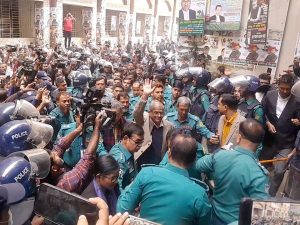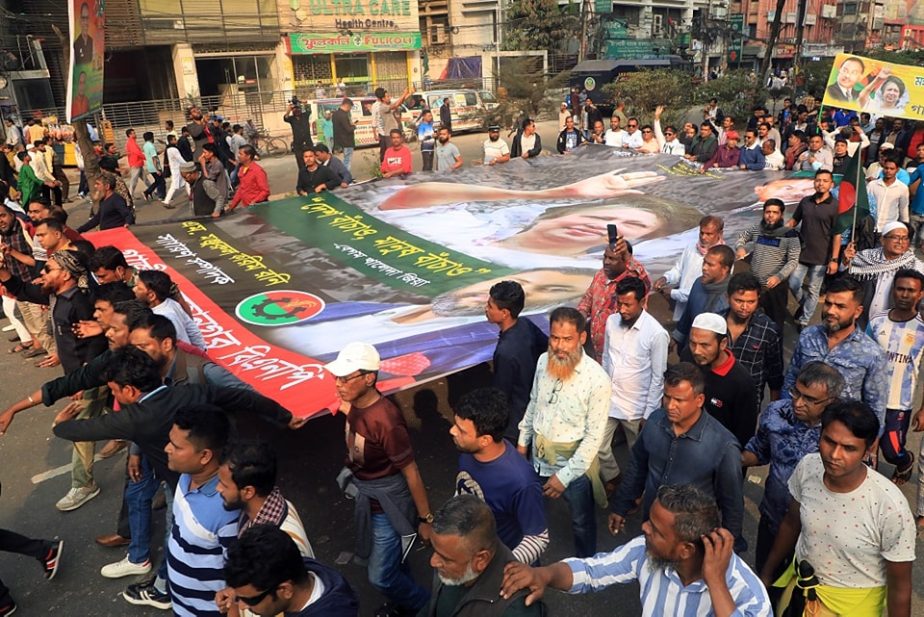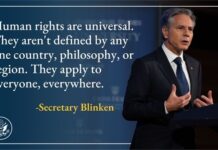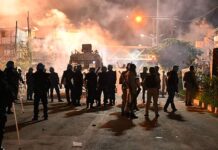
In an interview with The Diplomat’s Snigdhendu Bhattacharya, the BNP’s acting Chairman Tarique Rahman explains why his party is boycotting the election. “The predetermined upcoming election,” he said, “is non-participatory not just for the political parties, but the voters as well.” The son of former Bangladesh President Ziaur Rahman and former Prime Minister Khaleda Zia, Rahman, who spent 18 months in jail during 2006-07, has been living in self-imposed exile in London since 2008.
In this interview, Rahman discusses the BNP’s political strategy, the prospects for a free and fair election, and geopolitical considerations. Rahman argues that India’s concerns over the BNP’s ties with the Jamaat-e-Islami are misplaced, as the AL has aligned with the Islamist party several times in the past.
Why is the BNP determined to go ahead with the boycott of the 2024 elections?
It’s not the BNP alone, another 62 pro-democracy political parties have decided to boycott the so-called election on January 7. This decision arises from our commitment to representing the aspirations of the Bangladeshi people, ensuring their participation in a meaningful election, where they can freely cast their votes and those votes will be genuinely counted.
The tainted history of farcical elections under Prime Minister Sheikh Hasina, marked by various methods of rigging and irregularities, is well-documented globally. In 2014, the Awami League (AL) claimed 154 out of 300 seats uncontested, without any opposition candidate. In 2018, ballot boxes were stuffed the night before election day, making a mockery of democracy.
The AL is orchestrating another fraudulent election in 2024, with predetermined results negotiated with every participating party during the election build-up. The parties participating in the election are primarily historical allies of the AL, lacking public credibility. Among them, the Jatiya Party (JP) is the only party with some public base. However, the grassroots leaders of JP, in a meeting, expressed a vehement desire to boycott the election and terminate the alliance with AL, following which the state apparatus met the JP leadership and forced them to participate.
Sheikh Hasina has instructed AL candidates to field dummy candidates, not to win, but to boost the number of participants. Exploiting state resources, she unsuccessfully attempted to divide the BNP, and patronized the formation of so-called King’s parties (parties formed by opposition camp deserters with state backing), to create a false sense of inclusiveness with thousands of candidates. While there have been hiccups in AL’s seat distribution, such as the Zaker Party withdrawing over 200 candidates on the last day, many candidates from other small parties also wanted to withdraw but were reportedly barred by intelligence agencies.
If we see the inconsequential by-elections under Sheikh Hasina, AL activists engaged in extensive vote-rigging, continuing their longstanding pattern of manipulating elections with the aid of state resources. Each election witnessed the expulsion of agents representing opposition candidates from polling stations, blatant cases of flawed voter lists, fake voting, and the stuffing of ballot boxes. Last month, we encountered a new height of election fraud, when an AL polling agent managed to stamp 43 ballots in 57 seconds. It is evident that as long as Hasina retains power, every election in Bangladesh will involve extensive irregularities, making the much-anticipated level-playing field a distant dream.
As the election draws closer, the fascist regime is intensifying its nationwide crackdown on opposition leaders and activists, to purposefully create an atmosphere that is not conducive for inclusive elections. Prisons are overcrowded, yet arbitrary detention in fabricated cases persists, along with gross human rights violations such as enforced disappearances, extrajudicial killings, and brutal tortures. It is evident that only an inclusive, credible, and transparent election process, conducted under a non-political, neutral, election-time government, can reinstate voting rights and derive a public mandate in Bangladesh.
Won’t the BNP’s street agitations lose momentum in a few weeks, especially when the new government is in place?
Since Sheikh Hasina came to power in 2009, 2,687 persons have become victims of extrajudicial killings by law enforcement agencies, along with at least 675 documented instances of enforced disappearances. Over 138,500 politically motivated cases have been launched, against 5 million members of BNP and other democratic parties. Since our grand rally on October 28, over 22,000 leaders and activists have been arrested. The total number of inmates in jail is almost 2.5 times the capacity, even as the spree of arrests continues.
The BNP has endured unprecedented repression and injustice at the hands of the regime. This is a testament to our commitment to upholding democratic principles for the nation. As the main opposition party, we see it as our duty to restore the power that was unjustly taken away from the citizens but rightfully belongs to them. Regardless of whether the so-called election transpires or if Sheikh Hasina clings to power, the people of Bangladesh will remain united, with their deep-rooted public support for the BNP. While there could be strategic adjustments, looking at the bigger picture, the momentum of our movement can only go onward and upward from here.
The BNP’s latest rally on December 16, attended by hundreds of thousands of pro-democracy people, serves as a testament to our resilience against state-sponsored violence and the capacity to mobilize the masses. Over the past few years, we have organized massive rallies across Bangladesh, drawing millions of attendees, and marking an unprecedented chapter of participation in the nation’s history.
There is intense pressure on the AL government and the Election Commission to hold a free and fair election. Is the BNP convinced that this pressure won’t work?
Your question in itself is self-explanatory, vindicating an unfavorable condition for free and fair election, and reinforcing the moral and legitimate ground of our ongoing movement. The latest assertion of Agriculture Minister Abdur Razzaque that the BNP did not accept the proposal of joining the election in exchange for all its detained leaders getting released overnight, whom he claims have been kept in jail as part of a plan, exposes how the election build-up is marred by political arrests and judicial harassments by AL.
Sheikh Hasina has politicized the state apparatus – including judiciary, police, civil and military bureaucracy – by filling them with loyalists and making clear the consequences for not obeying illegal orders. She has wielded these institutions both to stifle dissent and carry out personal vengeance against political opponents.
The Election Commission’s indifference to the massive clampdown, and its approval of fake entities posing as parties and election observers, further proves the compromised integrity of the electoral process. The recent decision by the Commission directing the Ministry of Home Affairs to prohibit all political events except for election campaigns is troubling. The move to officially curb freedom of assembly and expression is not only unethical, illegal, and unconstitutional, but also indicative of Hasina’s overt control and manipulation of the Election Commission.
The BNP’s boycott of the 2014 election did not affect the Hasina government much in terms of international relations. On what basis is the BNP expecting its boycott of the upcoming election to weaken the Hasina government internationally?
Bangladesh is effectively ruled by a corrupt one-party government, propped up by oligarchs at home and authoritarian regimes abroad. Sheikh Hasina not only encourages threatening rhetoric against democratic nations, but also formulates controversial bilateral relations, leading to a gradual alienation from the democratic world. She disregards global calls for democratic principles and shows disrespect for the rules-based international order.
As democracy and human rights form the connecting bridge among democratic nations, the aspiration of the international community and Bangladeshi citizens converge in the shared goal of achieving a free, fair, participatory, and peaceful election. We are grateful to international stakeholders and development partners of Bangladesh, including the U.S., U.N., EU, U.K., Australia, Canada, Japan, and various human rights organizations for their moral support inspiring the pro-democracy movement. The people of Bangladesh greatly appreciate recent diplomatic measures, such as the U.S. sanctions on the Rapid Action Battalion and its visa restrictions, and the common call for credible elections, all of which play a crucial role in advancing democracy.

Bangladesh Nationalist Party supporters participate in a rally demanding that the elections be held only under a neutral, caretaker government, Dhaka, Bangladesh. They are , carrying a banner with BNP Chairperson Khaleda Zia’s photo. Credit: Facebook/Bangladesh Nationalist Party-BNP
What is the BNP’s plan of action for the party once Hasina returns to power? Wouldn’t non-participation isolate the party from the voters?
Not at all, because voters have already rejected this election. The political decision of the BNP is fostered by the sentiments of Bangladeshi people, reflecting our shared desire for a meaningful election. In fact, I believe, there is enough evidence that the AL has become further isolated by ravaging fascism. From garment workers to Nobel laureates, journalists to civil society, students to professionals – every facet of society is being denied fundamental rights and freedoms. The BNP’s one-point demand seeking for Sheikh Hasina’s resignation resembles the desire of most Bangladeshis. Our party further represents public interest in policy formulation, including the 31-Point Structural Reforms of the State and the Indo-Pacific Strategy.
I understand that the predetermined upcoming election is non-participatory not just for the political parties, but the voters as well, who find themselves devoid of opportunities to express their rights. In the last two elections under Hasina, a substantial majority of 120 million voters, including approximately 30 million youths who have become new voters since 2009, could not cast their votes. These disenfranchised individuals and the BNP strive for the same cause of voting rights, complementing each other for the overarching goal of empowering all Bangladeshis with freedom, equality, and prosperity, irrespective of gender, religion, ethnicity, or politics.
AL leaders say that the BNP is boycotting the election because of its own organizational weakness. Did the fact that many of the party’s leaders are behind bars or absconding play any role in the BNP decision to stay away from the election?
If we go by the number of activists, supporters, and participants, the BNP remains the largest and most popular political party in Bangladesh. Unable to face us with organizational strength, the AL is misusing the state machinery and committing atrocities, entrapping all our members from the grassroots to the highest level. Fearing the people-powered strength of the BNP and recognizing the AL’s alienation from people, the Hasina regime has orchestrated a situation so that the BNP cannot participate in the so-called election.
Senior BNP leaders, en masse, are facing verdicts exceeding two years, aiming at exploiting a legal provision that disqualifies individuals with two-year sentences from participating in elections. The biased judgments, relying on made-up charges, are often linked to the regime’s sabotaged arson attacks and fictitious incidents. The treatment of those in detention is highly concerning while custodial deaths keep rising. AL miscreants and police conduct joint attacks and home raids, involving gunfire, hacking, and cocktail bombs, resulting in the displacement of millions of our activists. In numerous incidents, they detain and torture relatives in the absence of targeted individuals.
AL leaders allege that it was the BNP during the 2006-08 period that discredited the neutral caretaker government system. Your comments?
The BNP government, in 1996, introduced the election-time, neutral, and non-party administration in the Constitution of Bangladesh, known as the Caretaker Government System. This resulted from a consensus among all political parties and was endorsed by public mandate, aiming to conduct free, fair, and credible elections. However, after forming the government in 2009, undermining nationwide aspiration to continue the Caretaker Government System, the AL abolished this provision, in an authoritarian attempt to hold power without legitimacy.
The “amicus curiae” appointed by the Appellate Division of the Supreme Court, including esteemed lawyers, overwhelmingly endorsed the continuity of the Caretaker Government System. A Parliamentary Committee, consulting with political parties, retired judges, jurists, civil society members, and national daily editors, unanimously supported the system. Despite every indication of continuation, Sheikh Hasina refused to recognize the overwhelming support from stakeholders and the public mandate. Instead, she instructed the Parliamentary Committee to abruptly repeal the Caretaker Government System.
An issue of concern in India about the BNP is its ties with Islamist parties, especially the Jamaat-e-Islami. Bangladesh under BNP rule was closer to Pakistan and wasn’t sensitive to India’s security concerns. Your comments?
As a big tent party, the BNP firmly believes that religion belongs to an individual, but the state is for all, and in our inclusive Bangladesh, everyone is entitled to equal rights. Our party adheres to a policy of not using religion as a political tool. However, the reality is that the constitutions of Bangladesh, India, and Pakistan grant the right to do politics based on religion, so these three countries have religious-based political parties.
Suppose India’s concern is only specifically against JI. In that case, it is worth noting that the AL has a history of good relations with JI. In 1966-70, the AL and JI campaigned simultaneously against the regime of Pakistani military dictator Ayub Khan; in 1986, the two parties simultaneously participated in elections to legitimize the regime of military dictator Ershad in Bangladesh; and in 1994-1996, they jointly campaigned against the democratically elected BNP government. So, is there no problem if JI allies itself with the AL? Similarly, is it a problem that JI may have an electoral alliance with the BNP?
On the other hand, if India’s concern is Islamism, it is necessary to mention that in 2006, the AL signed a written agreement with Islami Oikyazot for the formation of a Shariah-based Islamic state in Bangladesh. Hasina allowed radical Islamists to spread their tentacles within the AL’s ranks. Most recently, A.K.M. Bahauddin, an influential AL leader, was found lecturing the Hindus on how to observe Durga Puja and despite criticism, he refused to retract. On the contrary, his followers attacked the local Hindu population when they protested his remarks. He won the nomination of the AL again for the upcoming dummy election, despite warnings from Hindu leaders.
Our Indo-Pacific Strategy stresses a robust approach to countering terrorism, separatism, and extremism. We are committed to ensuring that the territory of Bangladesh is never used for activities detrimental to the security and interest of any state.
You have been away from Bangladesh for 15 years now, facing a jail term in the country in multiple cases, including a plot to kill Prime Minister Hasina when she was the opposition leader during your party’s rule. The government is trying to ensure your extradition. There is a court order in Bangladesh against airing or publishing your speeches and comments even on social media. How do you hope to lead BNP supporters under such circumstances?
The forced departure of the then-Chief Justice Surendra Kumar Sinha following his sudden fallout with Sheikh Hasina exposed the absence of judicial independence and shed light on how manipulated verdicts are imposed from outside courts. In another incident, Judge Md Motahar Hossain, who showed incredible courage by acquitting me in a fabricated case despite pressure from Hasina, had to flee from Bangladesh and seek refuge abroad to protect his life. I think the regime’s message is clear: for judges to retain their job, complying with pre-planned convictions is mandatory.
One notable figure propelling judicial injustice is Abdul Kahar Akand, who served as an investigation officer in several trumped-up cases, as per Sheikh Hasina’s directive. He orchestrated the fabricated conviction against me in the case you have highlighted, adding my name to the charge sheet seven years after the incident and manufacturing fake evidence that has no substance whatsoever. After retirement, he has emerged as the AL candidate for Kishoreganj-2 seat in the upcoming dummy election. I find this entwinement of government officials with AL politics, as a nexus between loyalty and reward, disturbing.
The Hasina regime not only implicated me in false charges and curtailed my freedom of expression, but also launched fictitious cases against my wife, who has no political involvement. Sheikh Hasina seized our properties in Bangladesh, and forcefully evicted my mother, Begum Khaleda Zia, former prime minister and the BNP chairperson, from our family home of over three decades. It is distressing to witness her being deprived of adequate medical care at this stage of life and health. My family and I continue to sacrifice for democracy, but we draw inspiration from the sufferings of millions of families in Bangladesh.
While in exile, I am deeply connected with the essence and people of Bangladesh, dedicating a significant part of my life to nationwide phone calls and online meetings. I see every day, as our leaders and activists are released from jail, they emerge fearless and resolute. They join street rallies or public meetings the next day, risking their lives for democratic ideals. I am inspired by this courage and enthusiasm and appreciate the uncompromising stance of pro-democracy people. To contribute from my end, I strive to unite stakeholders, mobilize grassroots, and strengthen their determination. Our shared passion to once again live in a free nation stems from a belief that the pursuit of democracy is invaluable, even in the face of a challenging political journey defined by suffering and adversity.
The Diplomat









